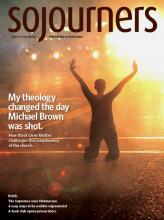ONLY SOCIAL MOVEMENTS really change history. Developing, nurturing, and supporting a new generation of leaders is central to the long-term success of these movements. As leaders like me get older and look to the future, mentoring young leaders is particularly important. More and more of my time is spent doing that mentoring, not only broadly but in relationship to particularly promising young leaders whom I have met. It is some of the most important and enjoyable work that I do.
For many years, Sojourners called together large conferences on biblical justice and peace. Thousands of people came year after year, and many positive things happened—new relationships, connections, projects, and organizations—even marriages and families! Now, several other groups are having justice and peace conferences, which is exactly the kind of “competition” Sojourners has always hoped for.
Last year, some of our younger staff came up with a great idea—to have a leadership “Summit” for people already providing leadership for the biblical vision of justice and peace. All the participants would have to be nominated by credible leaders doing this work, and instead of Justice 101 with big speakers and standing ovations, this would become a new, creative environment for moving justice agendas forward—Justice 202. We didn’t publicly advertise these gatherings—instead, the invitation spread by word of mouth as leaders, especially younger ones, were drawn together by experienced justice leaders who nominated them.
Read the Full Article
